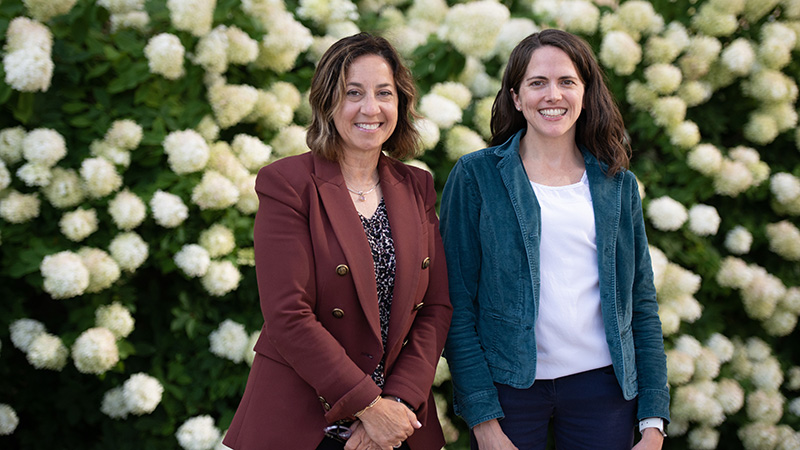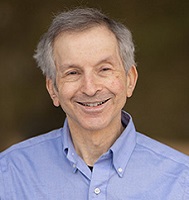
This article is part two of a two-part series on cystic fibrosis research and care at the University of Wisconsin. Part one featured the Wisconsin Cystic Fibrosis Neonatal Screening Project at its 40-year anniversary and its continuing research benefits.
The pathbreaking Wisconsin Cystic Fibrosis Neonatal Screening Project stopped accepting additional subjects for its first randomized clinical trial in 1994, when the benefits of the study’s early cystic fibrosis (CF) diagnosis plus special diet and supplements over the 10 years of the trial became abundantly clear. Soon after, one of the previous researchers, Michael Rock, MD, now emeritus professor, then a new Department of Pediatrics faculty member in the Division of Pulmonology and Sleep Medicine, worked to expand the existing University of Wisconsin cystic fibrosis program to offer these new proven treatments to patients.

Rock returned to the department as a faculty member in 1995 with five years of experience directing CF programs in Memphis. Soon after, in 1998, the Cystic Fibrosis Foundation initiated its Therapeutics Development Network (TDN) to facilitate research nationwide as knowledge and research quickly accelerated. The network is an organization of collaborative specialists in cystic fibrosis clinical research from many disciplines and institutions that recruit study participants and conduct clinical trials. Rock was determined to make the UW cystic fibrosis program both a treatment center and a research center: it had to meet strict criteria to be included as a member of the TDN.
With a Cystic Fibrosis Research Facilitation Award in 2006, Rock worked to build the substantial research infrastructure that the UW needed to conduct clinical trials for drugs and other therapeutics. Today, the UW Health Cystic Fibrosis Center is one of 130 Cystic Fibrosis Foundation-accredited care centers in the country. Additionally, it is one of 80 Therapeutics Development Centers — one of only two in Wisconsin — conducting clinical trials to increase treatment options for children and adults. Rock served as its director until his retirement in 2023. (He also worked on establishing affiliate CF centers in Green Bay and Marshfield.) Over those years, advances in the understanding of the pathogenesis and treatment of CF continued at a fast pace.
In 1989, as the Wisconsin Cystic Fibrosis Neonatal Screening Project was progressing, a group of researchers found the most common genetic cause of the disease: the mutation of the cystic fibrosis transmembrane conductance regulator (CFTR) gene — known as the ΔF508 mutation. Discovery of that gene mutation quickly led to improved blood spot diagnosis accuracy, which led eventually to nationwide newborn screening for CF. Further research revealed the genetic mutation was the source of defects in a specific protein product that caused the CF conditions. Some of those defective proteins can be now corrected through new protein modulator therapies — first approved by the FDA in 2012 — that are effective for people with specific protein mutations. The four CFTR treatments now available dramatically improve lung function and respiratory symptoms, with great improvements in nutrition, enhancing patients’ overall quality of life.
The UW Health Cystic Fibrosis Center’s current co-directors are Hara Levy, MD, MMSc, professor, Division of Pulmonology and Sleep Medicine, and Andrew Braun, MD, from the Department of Medicine. The center comprises two programs: the Pediatric Cystic Fibrosis Program, co-directed by Levy and Christina Barreda, MD, assistant professor and interim chief, Division of Pulmonology and Sleep Medicine; and the Adult Cystic Fibrosis Program, under Braun’s direction. The center continues to conduct research and treat patients with new transformational therapies with continued involvement in the TDN. The pediatric CF program follows approximately 100 patients while the adult program follows about 200.
Levy has been co-director of the pediatric program since she joined the department in May 2022. A deeply engaged physician-scientist, Levy came to the department with nearly 20 years of NIH-funded studies. Her research investigates the genomic basis of pulmonary diseases, particularly factors influencing the severity, pathogenesis, and treatment of cystic fibrosis. Early on in her career with K23 and DP2 research funding from NIH, she met Phillip Farrell, MD, PhD, now emeritus dean and professor of pediatric pulmonology, in 2007 and worked with his research team on the “Feeding Infants Right from the Start (FIRST)” study and on a total of nine CF studies through the subsequent decades.
Since the discovery of the first CFTR gene mutation, researchers have found 689 CF-causing gene variants. New gene sequencing technology can screen for these variants simultaneously. “We now understand CF as a spectrum of conditions that arise from various mutations,” Levy explained. “We must recognize and consider the many clinical variations in diagnosis of CF.” A paper by Levy and others in the UW CF research team examined the continuum of CFTR-associated disorders in 2016.
In a recent study, Levy and others showed that some of the many CFTR coding variants revealed that CF has been understudied in non-White populations because it had been understood to be nonexistent outside of that group. Some variants from diverse populations have been shown to be heritable — pointing to a necessary expansion of what can be considered CF symptoms. Thus, the ongoing Wisconsin Cystic Fibrosis Neonatal Screening Project and related research endeavors continue to expand knowledge in transformative ways.
Trained in a combined internal medicine and pediatrics residency at the Medical College of Wisconsin, Levy also brings to the department and the UW Health Cystic Fibrosis Center her innovative ideas for developing a cradle-to-adulthood pulmonary medicine program. She focuses on improving the often-difficult transition for patients from pediatric care to adult medical services. Levy noted that as survival rates for childhood illnesses improve, children and adolescents with these conditions face significant health risks that require complex, multidisciplinary care. Transitioning from pediatric to adult health care often presents barriers, such as difficulties in accessing appropriate care, managing developmental needs, and maintaining optimal health.
“This transition can exacerbate long-term physical and psychosocial effects of chronic conditions and their treatments,” Levy explained, “as well as complicate care for additional comorbidities. Coordinating the complexities of chronic care during the transition to adult care is crucial. And here in Madison, with the collaboration between the pediatric and adult CF programs, we are well positioned to accomplish this.”
Christina Barreda, MD, assistant professor and interim chief, Division of Pulmonology and Sleep Medicine, co-directs the Pediatric CF Program with Levy. Barreda joined the faculty after completing a three-year UW Pediatric Pulmonology Fellowship. She noted, “I have benefitted from having several incredible mentors — including Drs. Farrell and Rock — who provided me with excellent guidance and advice.”
Barreda explained that while there is still no cure for CF, the Pediatric CF Program relies on proven treatments such as good nutrition, pancreatic enzyme replacement, airway clearance, and effective infection control. Expanding access to care for those who qualify for protein modulation therapy is also a crucial task. “CFTR modulator therapy addresses some of the defective proteins that interrupt normal channels and cause many of CF’s serious conditions,” Barreda said. “But it’s not a cure. It’s genetic therapies that I think will eventually make that difference.”
She added, “We are really proud of our care team — and at the same time we know that we have big shoes to fill.”
Photo by Bob Gordon/Department of Pediatrics